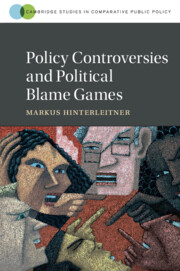Book contents
- Policy Controversies and Political Blame Games
- Cambridge Studies in Comparative Public Policy
- Policy Controversies and Political Blame Games
- Copyright page
- Contents
- Figures
- Tables
- Acknowledgments
- Abbreviations
- 1 How Political Systems Manage Their Policy Controversies
- 2 Blame Games in the Political Sphere
- 3 Blame Games in the UK
- 4 Blame Games in Germany
- 5 Blame Games in Switzerland
- 6 Mapping the Influence of Institutional Factors
- 7 Mapping the Influence of Issue Characteristics
- 8 A Typological Theory of Blame Games and Their Consequences
- 9 Blame Games and Their Implications for Politics and Democracy under Pressure
- Appendix
- Notes
- References
- Index
- References
References
Published online by Cambridge University Press: 30 October 2020
- Policy Controversies and Political Blame Games
- Cambridge Studies in Comparative Public Policy
- Policy Controversies and Political Blame Games
- Copyright page
- Contents
- Figures
- Tables
- Acknowledgments
- Abbreviations
- 1 How Political Systems Manage Their Policy Controversies
- 2 Blame Games in the Political Sphere
- 3 Blame Games in the UK
- 4 Blame Games in Germany
- 5 Blame Games in Switzerland
- 6 Mapping the Influence of Institutional Factors
- 7 Mapping the Influence of Issue Characteristics
- 8 A Typological Theory of Blame Games and Their Consequences
- 9 Blame Games and Their Implications for Politics and Democracy under Pressure
- Appendix
- Notes
- References
- Index
- References
Summary
- Type
- Chapter
- Information
- Policy Controversies and Political Blame Games , pp. 234 - 244Publisher: Cambridge University PressPrint publication year: 2020
- Creative Commons
- This content is Open Access and distributed under the terms of the Creative Commons Attribution licence CC-BY-NC-ND 4.0 https://creativecommons.org/cclicenses/



